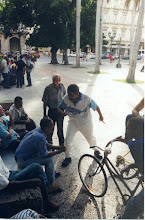In Cuba Standard, a column of
mine on the Administration’s consideration of allowing Title III of the
Helms-Burton law to go into effect next February. Spoiler: It’s a bad idea.
Friday, December 14, 2018
Thursday, December 13, 2018
Radio/TV Marti in the news
The Washington
Post and New
York Times have stories today on Radio/TV Marti and, in the Times’ case, on
U.S. international broadcasting in general. Both are worth reading. From them,
some items of note:
The report on the investigation of the Soros program is “due out in early January,” according to the Times.
The report on the investigation of the Soros program is “due out in early January,” according to the Times.
The anti-Islam
article on the Radio/TV Marti website (now withdrawn but cached here),
first reported in El Nuevo Herald, was published in September. Unlike the Soros
content, this was published months after the current director Tomas Regalado
came on board.
The Times story
is inaccurate in saying that Judicial Watch was “relied on” for material in the
Soros program. The program gives that impression by mentioning Judicial Watch
repeatedly, but no one from that organization is interviewed, nor are they or
their work cited specifically. The Post interviewed Judicial Watch President
Tom Fitton, who says his organization was not contacted as the program was
being prepared. This, and Regalado’s comment that Judicial Watch is a “good
source,” is one of the strangest aspects of the program.
Neither article
gets at the question of the Soros program’s origin. Maybe someone at Radio/TV
Marti thought it up, but I doubt it.
Tuesday, December 11, 2018
Radio/TV Marti in action (corrected)
(This was posted 12/13; see correction below, posted 12/17.)
Last week I attended the second public meeting of the State Department’s Cuba Internet Task Force. I didn’t intend to write about it until I saw the coverage from Radio/TV Marti.
Last week I attended the second public meeting of the State Department’s Cuba Internet Task Force. I didn’t intend to write about it until I saw the coverage from Radio/TV Marti.
At the meeting,
two items of business were accomplished. The task force heard from two
organizations that were charged with developing recommendations: Freedom House
and the Information Technology Industry Council. Then the task force gave the
State Department’s Cuba desk the job of writing its report. The report will
contain recommendations to the Secretary of State based on its views, the ideas
submitted by these organizations, and public comments.
Radio/TV Marti
director Tomas Regalado is a member of the task force, and Radio/TV Marti’s story
on the task force meeting is all about him. I don’t have verbatim notes, but I
think it’s fair to say that he objected to some of the recommendations that
were put forward because they involved dealing with the Cuban government and
enterprises, and could involve commercial activity.
He moved to have
some of these ideas stricken from the report that will go to the Secretary of State,
and he announced portentously that if they were not stricken then he would
resign from the task force, pick up his marbles, and go home.
He didn’t seem
to understand no such motion could be entertained because no such report had
been written; there was no draft in front of the members that could be amended.
There were two reports from outside groups, that’s all. The deliberation and
drafting is about to begin. This was explained by the State Department’s press
office here.
This never sunk
in with Mr. Regalado, however. Even after the meeting, in the video
accompanying the story (at 1:10), he is talking about report already drafted,
destined for the Secretary of State and the President.
It’s pretty
obvious that this story was pre-planned. The fact that its premise was wrong didn’t
stop Radio/TV Marti from running it.
What does this
say about the journalism that Radio/TV Marti is practicing?
They didn’t send
a reporter to cover a public meeting that was open to press coverage – and if
they sent a reporter, either that reporter didn’t understand what was going on,
or decided to go with Mr. Regalado’s misrepresentation. The facts were set
aside in favor of the pre-cooked story. Pathetic.
The story
covered only Mr. Regalado – nothing on the statements of the government
officials present, nothing on the representatives of Freedom House and the
Information Technology Industry Council who presented their interesting
reports, nothing on the discussion that ensued. Real journaIism would present
the content of those groups’ presentations, in addition to Mr. Regalado’s
criticism – to say nothing of giving a complete sense of what happened at the
meeting beyond one person’s interventions. This is more like propaganda.
Mr. Regalado is
certainly a qualified commentator. But his personal involvement in a misleading
story like this shows he has no place running a news organization.
The story linked
above is introduced by two anchors and then cuts to a report from a reporter in
the Miami newsroom. The reporter is Mr. Regalado’s son. This isn’t nepotism
because the son was there long before the father was hired. But apparently, Radio/TV
Marti has no editor to point out that it’s wrong to assign a reporter to cover
a story about an immediate family member, in this case his father.
In the video,
Mr. Regalado says he felt a responsibility to speak as “the only Cuban voice of
the exile community.” It was important to note, he said, that “with the Cuban
government one can’t negotiate, with the Cuban government one can’t talk, that
the Cuban government is the problem, not the solution, and that in the United
States there are brilliant minds, there are people who can design a series of
projects to give free Internet to the Cuban people.”
Therein lies the
real story from the meeting that Radio/TV Marti completely blew. Current Trump
Administration regulations provide ample space for American companies to be
involved in Internet and telecommunications, including selling equipment to
businesses and consumers and, should Cuban officials and enterprises agree, to
help extend the network. Mr. Regalado has a different idea: for the U.S.
government to involve itself in “a series of projects” to expand access
independent of Cuban networks. Haven’t we seen that movie before?
Some may think I’m
writing as part of a campaign to bring down Radio and TV Marti. Not quite.
Realistically speaking, I will sooner become President of the United States
than Congress will end this waste.
But Congress
could do us a favor: divorce them from the Voice of America and call them the
Voice of El Exilio. That would end the association with poor Jose Marti and
diminish the association with us.
-->
-->
Correction (12/17):
In fact there
were two stories on this meeting. There was the one that centered on Mr.
Regalado, discussed above, which was the front-page story on the Radio/TV Marti
website, and there was another that I missed.
The other
story is based in part on reporting from the meeting – so I was wrong to
say they didn’t send a reporter.
How did this
story cover the meeting?
It notes that
recommendations were presented at the meeting and it describes some of them,
but for some reason it fails to note that they were presented by
representatives of Freedom House and the Information Technology Industry
Council. Isn’t it a basic task for a reporter covering a public meeting to
identify who said what?
The story notes
that “some of these recommendations were rejected by the audience” but it fails
to report that some in the audience supported them. What do you call journalism
that reports one point of view and omits its opposite?
The story omitted
other aspects of the discussion. There was a suggestion that current Treasury
regulations should be maintained so as to enable U.S. companies to try to get
involved commercially in expanding the Cuban network, and there was another suggestion
that the United States use technologies that can expand Internet access in Cuba
without any connection to the Cuban network. Neither was mentioned.
It does not
report on Mr. Regalado’s confusion, discussed above.
So that’s the
correction. I stand by the rest of what I wrote.
In the farm bill, a small step forward
Congress will soon vote on the 2018 Farm Bill, which
authorizes agricultural and food assistance programs. The final version,
released yesterday, includes an amendment by outgoing Senator Heitkamp of North
Dakota, to end the prohibition on the use of the Department of Agriculture’s
export promotion programs in Cuba. Her amendment passed the Senate unanimously
after Senator Rubio threatened to remove it, but soon retreated and accepted
it.
To my knowledge, Cuba was the only country where our
Department of Agriculture was barred from promoting U.S. exports. By itself, this
move will not add hundreds of millions to U.S. exports, but it is a sensible
step forward and it will help. The text of the bill is here;
Heitkamp’s amendment appears on page 130 and the explanation of its meaning is
on page 614.
President Trump has plenty of grievances with Cuba, and some
make sense. Hopefully he will remember how, as a businessman, he explored Cuba’s
potential for his hotel/resort business, and see the country as a place where
more U.S. economic engagement could benefit both peoples.
Subscribe to:
Posts (Atom)




